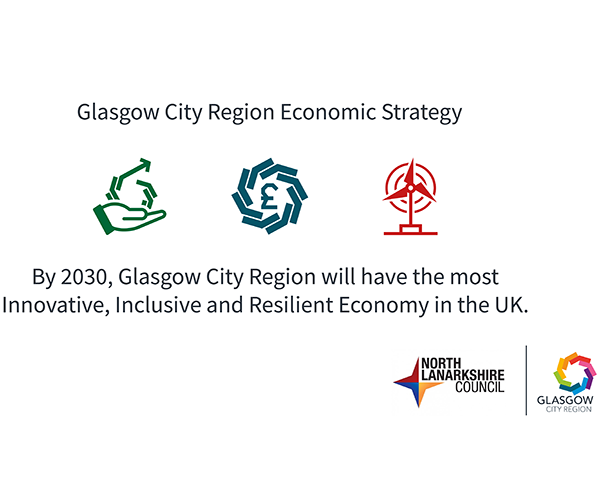North Lanarkshire is set to benefit from a new economic strategy that will improve and strengthen the Glasgow City Region.
The strategy covers eight partner councils that comprise Glasgow City Region including North Lanarkshire, and will impact on wider public sector policy, decision-making and spend over the next ten years and on its 1.8 million residents and 50,000 businesses.
The strategy sets the approach for how the Region will weather current and future key challenges, some of which are expected to completely disrupt our way of life - including the impact of Covid-19, the climate emergency, and unprecedented technological advances.
The approach is a first in that it has been developed and endorsed not only by the Region’s eight councils, but by government and wider public sector agencies including Scottish Enterprise and Skills Development Scotland - all of which will be instrumental in its delivery.
The strategy, developed by the Region’s Intelligence Hub, is the result of months of extensive research with input from partners across the councils, government agencies, local universities, the business and third sectors. It is underpinned by an in-depth analysis of the Region’s strengths and the current and future challenges faced - collectively and individually by the eight council areas of Glasgow, East Dunbartonshire, East Renfrewshire, Inverclyde, North Lanarkshire, Renfrewshire, South Lanarkshire and West Dunbartonshire.
Leader of North Lanarkshire Council, Councillor Jim Logue, said, “Undoubtedly we are facing enormous challenges following the impact of Covid-19 and the ongoing consequences of climate change but it’s vital that we harness these impacts to lay the foundations for a more robust local economy. We must use these triggers for change as a way to improve investment in our area, embrace technological change and adopt our practices for a more sustainable and resilient region.
“The Regional Economic Strategy outlines the strengths and opportunities for all eight council areas and the key issues faced collectively by the Region. It brings clarity to our priorities and helps to inform decision-making around issues of place, skills and health and our efforts to reach net zero emissions across North Lanarkshire and the Region. In North Lanarkshire our place-based investment has continued at pace over the last year to improve our essential infrastructure, reduce carbon emissions and significantly boost the digital economy to make our towns and communities vibrant, inclusive, thriving, sustainable places and to improve the lives of people living in them.”
Three key Regional challenges are woven through the strategy:
- The imperative to address the climate emergency: This includes managing the risk of rising sea levels, flooding, coastal erosion and heatwaves; supporting businesses to address climate action to improve their efficiency, productivity and competitiveness; and ensuring the transition to net zero is fair and equitable, particularly as the most deprived communities are likely to be impacted most from climate change. This will involve work to look at skills, both to support people to access the job opportunities arising from the net zero, climate resilient shift, and those working in industries where jobs may be affected.
- The need to create a much more inclusive economy. With the Region home to some of the most deprived communities in Scotland, actions need to tackle the underlying drivers such as rising underemployment, economic activity due to ill health and low employment rates for specific groups.
- The long-standing issue of low productivity has constrained the local economy. Actions will need to address growing the number of businesses per capital and business Research and Development spend, both of which need to increase.
A new vision sets out the partners’ commitment to address these challenges:
By 2030, Glasgow City Region will have the most Innovative, Inclusive and Resilient Economy in the UK.
Opportunities have also been identified which could transform the Region. These include a focus on the Foundational Economy and High Growth sectors and addressing Climate Change.
In delivering the strategy, a series of programmes will be taken forward, some of which are already underway and some which require to be further developed. A number of exciting initiatives are anticipated in the coming months including proposals to establish a Regional investment fund; and programmes for Fair and Healthy Work; Green Business Support; a Green Demonstrator for electric vehicle charging; a Future Towns and City initiative which will use the latest data technology to understand shifting demands on our town centres to support policy development; and finally a Foundational Economy pilot to support growth and innovation in a sector which makes up 60% of the Region’s jobs and 40% of its businesses.
Work will now take place by the City Region to develop a detailed action plan over the next six months which will assign ownership of actions across the member councils and wider partnership, with indicative costs, and framework for monitoring and evaluation.
Find out more about the The Regional Economic Strategy.
